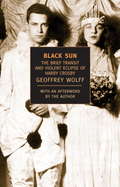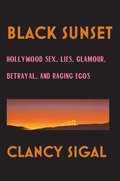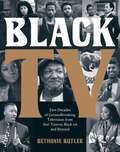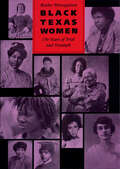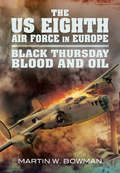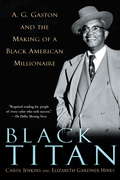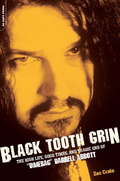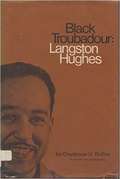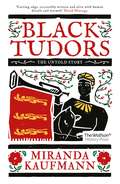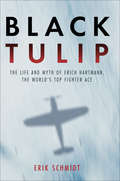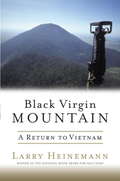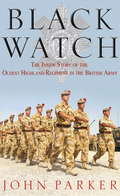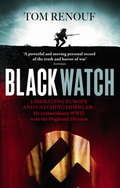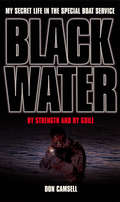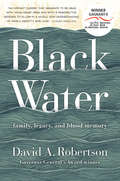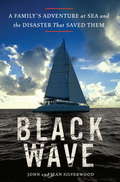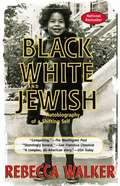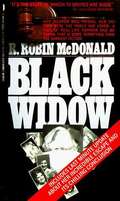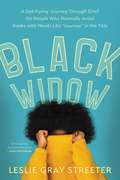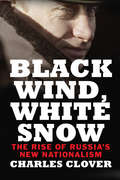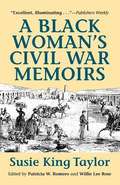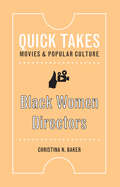- Table View
- List View
Black Sun
by Geoffrey WolffIncludes an afterword by the author. Harry Crosby was the godson of J. P. Morgan and a friend of Ernest Hemingway. Living in Paris in the twenties and directing the Black Sun Press, which published James Joyce among others, Crosby was at the center of the wild life of the lost generation. Drugs, drink, sex, gambling, the deliberate derangement of the senses in the pursuit of transcendent revelation: these were Crosby's pastimes until 1929, when he shot his girlfriend, the recent bride of another man, and then himself. Black Sun is novelist and master biographer Geoffrey Wolff's subtle and striking picture of a man who killed himself to make his life a work of art.
Black Sunset: Hollywood Sex, Lies, Glamour, Betrayal and Raging Egos
by Clancy SigalThis a hilarious memoir ofClancy Sigal’s escapades as a young Hollywood agent on the Sunset Strip, peddling writers and actors in a blacklist-crazed "golden age” movie industry of the 1950s. Atom bomb tests light up the night sky, and everyone is either naming names or getting named in the McCarthy witch hunt. By day a fast-talking salesman, at night he’s the point person of a small circle of anarchistic oddballs. He’s dogged by two FBI agents who want to be set up with starlets and have a screentest. They trail him as he goes from studio to studio hustling clients like Humphrey Bogart, Donna Reed, Jack Palance, Peter Lorre and Stanwyck. Barred from a studio he brazenly uses a bolt cutter to break through the chainlink fence to make a deal. Black Sunset’s riproaring ribald style belongs to a hardboiled school that includes Elmore Leonard and Raymond Chandler. He is one of the few remaining witnesses and reporters of this absurd and terrifying time.
Black TV: Five Decades of Groundbreaking Television from Soul Train to Black-ish and Beyond
by Bethonie ButlerWith iconic imagery and engrossing text, Black TV is the first book of its kind to celebrate the groundbreaking, influential, and often under-appreciated shows centered on Black people and their experiences from the last fifty years. Over the past decade, television has seen an explosion of acclaimed and influential debut storytellers including Issa Rae (Insecure), Donald Glover (Atlanta), and Michaela Coel (I May Destroy You). This golden age of Black television would not be possible without the actors, showrunners, and writers that worked for decades to give voice to the Black experience in America. Written by veteran TV reporter Bethonie Butler, Black TV tells the stories behind the pioneering series that led to this moment, celebrating the laughs, the drama, and the performances we&’ve loved over the last fifty years. Beginning with Julia, the groundbreaking sitcom that made Diahann Carroll the first Black woman to lead a prime-time network series as something other than a servant, she explores the 1960s and 1970s as an era of unprecedented representation, with shows like Soul Train, Roots, and The Jeffersons. She unpacks the increasingly nuanced comedies of the 1980s from 227 to A Different World, and how they paved the way for the &’90s Black-sitcom boom that gave us The Fresh Prince of Bel-Air and Living Single. Butler also looks at the visionary comedians—from Flip Wilson to the Wayans siblings to Dave Chappelle—and connects all these achievements to the latest breakthroughs in television with showrunners like Shonda Rhimes, Ava DuVernay, and Quinta Brunson leading the charge. With dozens of photographs reminding readers of memorable moments and scenes, Butler revisits breakout performances and important guest appearances, delivering some overdue accolades along the way. So, put on your Hillman sweatshirt, make some popcorn, and get ready for a dyn-o-mite retrospective of the most groundbreaking and entertaining shows in television history.
Black Texas Women: 150 Years Of Trial And Triumph
by Ruthe WinegartenWomen of all colors have shaped families, communities, institutions, and societies throughout history, but only in recent decades have their contributions been widely recognized, described, and celebrated. This book presents the first comprehensive history of black Texas women, a previously neglected group whose 150 years of continued struggle and some successes against the oppression of racism and sexism deserve to be better known and understood. Beginning with slave and free women of color during the Texas colonial period and concluding with contemporary women who serve in the Texas legislature and the United States Congress, Ruthe Winegarten organizes her history both chronologically and topically. Her narrative sparkles with the life stories of individual women and their contributions to the work force, education, religion, the club movement, community building, politics, civil rights, and culture. The product of extensive archival and oral research and illustrated with over 200 photographs, this groundbreaking work will be equally appealing to general readers and to scholars of women’s history, black history, American studies, and Texas history.
Black Thursday Blood and Oil: Black Thursday Blood And Oil (The US Eighth Air Force in Europe #2)
by Martin W. BowmanThis book describes the period when the American daylight offensive faltered and nearly failed and recalls the terrible losses suffered by Liberators on the low-level attack on the Ploesti oilfields in Rumania and by the B–17s on the notorious Schweinfurt and Regensburg raids which entered 8th Air Force folklore as Black Thursday. Fascinating anecdotes, eye-witness accounts and the hard-won experiences of the battle-scarred American fly-boys reveal the grim realities of air combat at four miles high above enemy occupied Europe, Berlin and the Ruhr. Grown up in the war they paint a revealing picture as only they can. The Mighty Eighth was an air force of hard-fighting, hard-playing fliers who suffered more casualties than the entire US Marine Corps in the Pacific Campaign. Here, in their own words are stories of survival and soul-numbing loss, of fly-boys who came together to fight an air war of the ferocity that had never been fought on such a vast scale before. While RAF Bomber Command was waging war at night, the 8th Air Force B–17 Flying Fortresses and B-24 Liberators bombed by day in a 24-hour round the clock campaign. This is also a partly a strategic history with a behind-the-scenes look at deployment of the bomber groups and the fighter escorts that would eventually become their salvation on the interminable deep penetration raids into the Greater Reich.
Black Titan: A. G. Gaston and the Making of a Black American Millionaire
by Carol Jenkins Elizabeth Gardner HinesThe grandson of slaves, born into poverty in 1892 in the Deep South, A. G. Gaston died more than a century later with a fortune worth well over $130 million and a business empire spanning communications, real estate, and insurance. Gaston was, by any measure, a heroic figure whose wealth and influence bore comparison to J. P. Morgan and Andrew Carnegie. Here, for the first time, is the story of the life of this extraordinary pioneer, told by his niece and grandniece, the award-winning television journalist Carol Jenkins and her daughter Elizabeth Gardner Hines. Born at a time when the bitter legacy of slavery and Reconstruction still poisoned the lives of black Americans, Gaston was determined to make a difference for himself and his people. His first job, after serving in the celebrated all-black regiment during World War I, bound him to the near-slavery of an Alabama coal mine—but even here Gaston saw not only hope but opportunity. He launched a business selling lunches to fellow miners, soon established a rudimentary bank—and from then on there was no stopping him. A kind of black Horatio Alger, Gaston let a single, powerful question be his guide:What do our people need now?His success flowed from an uncanny genius for knowing the answer. Combining rich family lore with a deep knowledge of American social and economic history, Carol Jenkins and Elizabeth Hines unfold Gaston’s success story against the backdrop of a century of crushing racial hatred and bigotry. Gaston not only survived the hardships of being black during the Depression, he flourished, and by the 1950s he was ruling a Birmingham-based business empire. When the movement for civil rights swept through the South in the late 1950s and early 1960s, Gaston provided critical financial support to many activists. At the time of his death in 1996, A. G. Gaston was one of the wealthiest black men in America, if notthewealthiest. But his legacy extended far beyond the monetary. He was a man who had proved it was possible to overcome staggering odds and make a place for himself as a leader, a captain of industry, and a far-sighted philanthropist. Writing with grace and power, Jenkins and Hines bring their distinguished ancestor fully to life in the pages of this book. Black Titanis the story of a man who created his own future—and in the process, blazed a future for all black businesspeople in America.
Black Titan: A.G. Gaston and the Making of a Black American Millionaire
by Carol Jenkins Elizabeth Gardner HinesThe grandson of slaves, born into poverty in 1892 in the Deep South, A. G. Gaston died more than a century later with a fortune worth well over $130 million and a business empire spanning communications, real estate, and insurance. Gaston was, by any measure, a heroic figure whose wealth and influence bore comparison to J. P. Morgan and Andrew Carnegie. Here, for the first time, is the story of the life of this extraordinary pioneer, told by his niece and grandniece, the award-winning television journalist Carol Jenkins and her daughter Elizabeth Gardner Hines.Born at a time when the bitter legacy of slavery and Reconstruction still poisoned the lives of black Americans, Gaston was determined to make a difference for himself and his people. His first job, after serving in the celebrated all-black regiment during World War I, bound him to the near-slavery of an Alabama coal mine--but even here Gaston saw not only hope but opportunity. He launched a business selling lunches to fellow miners, soon established a rudimentary bank--and from then on there was no stopping him. A kind of black Horatio Alger, Gaston let a single, powerful question be his guide: What do our people need now? His success flowed from an uncanny genius for knowing the answer. Combining rich family lore with a deep knowledge of American social and economic history, Carol Jenkins and Elizabeth Hines unfold Gaston's success story against the backdrop of a century of crushing racial hatred and bigotry. Gaston not only survived the hardships of being black during the Depression, he flourished, and by the 1950s he was ruling a Birmingham-based business empire. When the movement for civil rights swept through the South in the late 1950s and early 1960s, Gaston provided critical financial support to many activists.At the time of his death in 1996, A. G. Gaston was one of the wealthiest black men in America, if not the wealthiest. But his legacy extended far beyond the monetary. He was a man who had proved it was possible to overcome staggering odds and make a place for himself as a leader, a captain of industry, and a far-sighted philanthropist. Writing with grace and power, Jenkins and Hines bring their distinguished ancestor fully to life in the pages of this book. Black Titan is the story of a man who created his own future--and in the process, blazed a future for all black businesspeople in America.From the Hardcover edition.
Black Titan: A.G. Gaston and the Making of a Black American Millionaire
by Carol Jenkins Elizabeth Gardner HinesThe grandson of slaves, born into poverty in 1892 in the Deep South, A. G. Gaston died more than a century later with a fortune worth well over $130 million and a business empire spanning communications, real estate, and insurance. Gaston was, by any measure, a heroic figure whose wealth and influence bore comparison to J. P. Morgan and Andrew Carnegie. Here, for the first time, is the story of the life of this extraordinary pioneer, told by his niece and grandniece, the award-winning television journalist Carol Jenkins and her daughter Elizabeth Gardner Hines.Born at a time when the bitter legacy of slavery and Reconstruction still poisoned the lives of black Americans, Gaston was determined to make a difference for himself and his people. His first job, after serving in the celebrated all-black regiment during World War I, bound him to the near-slavery of an Alabama coal mine--but even here Gaston saw not only hope but opportunity. He launched a business selling lunches to fellow miners, soon established a rudimentary bank--and from then on there was no stopping him. A kind of black Horatio Alger, Gaston let a single, powerful question be his guide: What do our people need now? His success flowed from an uncanny genius for knowing the answer. Combining rich family lore with a deep knowledge of American social and economic history, Carol Jenkins and Elizabeth Hines unfold Gaston's success story against the backdrop of a century of crushing racial hatred and bigotry. Gaston not only survived the hardships of being black during the Depression, he flourished, and by the 1950s he was ruling a Birmingham-based business empire. When the movement for civil rights swept through the South in the late 1950s and early 1960s, Gaston provided critical financial support to many activists.At the time of his death in 1996, A. G. Gaston was one of the wealthiest black men in America, if not the wealthiest. But his legacy extended far beyond the monetary. He was a man who had proved it was possible to overcome staggering odds and make a place for himself as a leader, a captain of industry, and a far-sighted philanthropist. Writing with grace and power, Jenkins and Hines bring their distinguished ancestor fully to life in the pages of this book. Black Titan is the story of a man who created his own future--and in the process, blazed a future for all black businesspeople in America.From the Hardcover edition.
Black Tooth Grin: The High Life, Good Times, and Tragic End of "Dimebag" Darrell Abbott
by Zac CrainBlack Tooth Grin is the first biography of "Dimebag" Darrell Abbott, the Texas-bred guitarist of the heavy metal band Pantera, who was murdered onstage in 2004 by a deranged fan-24 years to the day after John Lennon met a similar fate.Darrell Abbott began as a Kiss-inspired teenage prodigy who won dozens of local talent contests. With his brother, drummer Vinnie Abbott, he formed Pantera, becoming one of the most popular bands of the '90s and selling millions of albums to an intensely devoted fan base. While the band's music was aggressive, "Dime" was outgoing, gregarious, and adored by everyone who knew him.From Pantera's heyday to their implosion following singer Phil Anselmo's heroin addiction to Darrell's tragic end, Black Tooth Grin is a moving portrait of a great artist.
Black Troubadour Langston Hughes
by Charlemae H. RollinsLangston Hughes was an American poet, social activist, novelist, playwright, and columnist. He was one of the earliest innovators of the then-new literary art form jazz poetry. Hughes is best known as a leader of the Harlem Renaissance.<P><P>Winner of the Coretta Scott King Medal
Black Tudors: The Untold Story
by Miranda KaufmannShortlisted for the Wolfson History Prize 2018 A Book of the Year for the Evening Standard and the Observer A black porter publicly whips a white Englishman in the hall of a Gloucestershire manor house. A Moroccan woman is baptised in a London church. Henry VIII dispatches a Mauritanian diver to salvage lost treasures from the Mary Rose. From long-forgotten records emerge the remarkable stories of Africans who lived free in Tudor England… They were present at some of the defining moments of the age. They were christened, married and buried by the Church. They were paid wages like any other Tudors. The untold stories of the Black Tudors, dazzlingly brought to life by Kaufmann, will transform how we see this most intriguing period of history.
Black Tulip: The Life and Myth of Erich Hartmann, the World's Top Fighter Ace
by Erik SchmidtThis myth-busting military biography reveals the true story of the legendary WWII German flying ace—and how his story was manipulated during the Cold War.Over the course of 1,404 wartime missions, Luftwaffe fighter pilot Erich Hartmann claimed a staggering 352 airborne kills. His storied career contains all the dramas you would expect: frostbitten fighter sweeps over the Eastern Front, drunken forays to Hitler’s Eagle’s Nest, a decade of imprisonment in the wretched Soviet POW camps, and further military service during the Cold War. Then, just as Hartmann’s career was faltering, he was adopted by a network of writers and commentators deeply invested in his reputation. These men, mostly Americans, published celebratory stories about Hartmann and his elite fraternity of Luftwaffe pilots. With each dogfight tale put into print, Hartmann’s legacy became loftier and more secure, and his complicated service in support of Nazism faded away. Black Tulip digs beneath this one-dimensional account of Hartmann’s life, revealing a man who was neither a full-blown Nazi nor an impeccable knight.
Black Virgin Mountain: Return to Vietnam
by Larry HeinemannIn 1967 Larry Heinemann was sent to Vietnam as an ordinary soldier. It was the most horrific year of his life, truly altering him--and his family--forever. In his powerful memoir, Heinemann returns to Vietnam, riding the train from Hanoi to Ho Chi Minh city and confronting the memories of his war year. Black Virgin Mountain confirms Heinemann's legendary plain-spoken reputation as one of the essential chroniclers of our war in Vietnam.
Black Watch
by John ParkerThe Black Watch is one of the finest fighting forces in the world and has been engaged in virtually every worldwide conflict for the last three centuries. Named after the dark tartan of the soldiers' kilts, it is the oldest Highland regiment. As part of the British army, their first battle abroad was in Flanders in 1745 but the regiment soon moved to North America to fight the French, and then shared the capture of Montreal, the Windward Islands and Martinique. The American War of Independence saw the regiment once again in America, fighting horrific battles and eventually storming Fort Washington in 1776. Since then the regiment has held its own from the Napoleonic Wars to the Indian mutiny to Iraq. The Black Watch is the UK's most decorated regiment, combining the proud history and tradition of an organisation that has been soldiering for over 250 years.
Black Watch: Liberating Europe and Catching Himmler My Extraordinary WW2 with the Highland Division
by Tom RenoufAs a 19-year old Black Watch conscript Tom Renouf's war began with some of the most vicious fighting of the conflict - against Himmler's fanatical 'Hitler Youth' SS Division. It ended with the capture of Himmler himself and Tom taking a trophy he still treasures - the Gestapo commander's watch.Seriously wounded and later decorated with a Military Medal for gallantry, Tom Renouf witnessed the death and maiming of countless of his teenage comrades and saw the survivors transformed into grizzled veterans. Tom Renouf draws on his own personal experiences - as well as his unique archive of interviews with veterans amassed over twenty years as secretary of the 51st Highland Division Veterans' Association - to paint a vivid picture of the Battle of Normandy, the liberation of Holland, the Battle of the Bulge and many more memorable WW2 events.
Black Watch: Liberating Europe and catching Himmler - my extraordinary WW2 with the Highland Division
by Dr. Tom RenoufAs a 19-year old Black Watch conscript Tom Renouf's war began with some of the most vicious fighting of the conflict - against Himmler's fanatical 'Hitler Youth' SS Division. It ended with the capture of Himmler himself and Tom taking a trophy he still treasures - the Gestapo commander's watch.Seriously wounded and later decorated with a Military Medal for gallantry, Tom Renouf witnessed the death and maiming of countless of his teenage comrades and saw the survivors transformed into grizzled veterans. Tom Renouf draws on his own personal experiences - as well as his unique archive of interviews with veterans amassed over twenty years as secretary of the 51st Highland Division Veterans' Association - to paint a vivid picture of the Battle of Normandy, the liberation of Holland, the Battle of the Bulge and many more memorable WW2 events.
Black Water: By Strength and By Guile
by Don CamsellDon Camsell joined the men in black of the SBS in 1974. From the deserts of Oman to the hills of Port Stanley, from the bottom of Gibraltar harbour to the deep, cold, black waters of Loch Long and from the QE2 to the back alleys of Belfast, his new role demanded that Don fought in just about every theatre of war - overt or covert.
Black Water: Family, Legacy, and Blood Memory
by David A. Robertson“An instant classic that demands to be read with your heart open and with a perspective widened to allow in a whole new understanding of family, identity, and love.” —Cherie DimalineA son who grew up away from his Indigenous culture takes his Cree father on a trip to their family's trapline, and finds that revisiting the past not only heals old wounds but creates a new future.The son of a Cree father and a non-Indigenous mother, David A. Robertson was raised with virtually no knowledge or understanding of his family’s Indigenous roots. His father, Don, spent his early childhood on a trapline in the bush northeast of Norway House, Manitoba, where his first teach was the land. When his family was moved permanently to a nearby reserve, Don was not permitted to speak Cree at school unless in secret with his friends and lost the knowledge he had been gifted while living on his trapline. His mother, Beverly, grew up in a small Manitoba town with not a single Indigenous family in it. Then Don arrived, the new United Church minister, and they fell in love. Structured around a father-son journey to the northern trapline where Robertson and his father will reclaim their connection to the land, Black Water is the story of another journey: a young man seeking to understand his father's story, to come to terms with his lifelong experience with anxiety, and to finally piece together his own blood memory, the parts of his identity that are woven into the fabric of his DNA.
Black Wave
by Jean Silverwood John SilverwoodThe heart-pumping true story of one family's terrifying battle for survival after disaster strikes on the high seas. It was a case of now or never for Jean and John Silverwood when they decided to give their four young children a taste of adventure on the high seas. Their bold decision to leave behind their everyday lives to sail across the world on a catamaran tested them all in ways they could never have imagined. Living off the grid could be paradise one day, a race to escape pirates the next, but perhaps the most difficult challenge of all in this brave new world was living and working together in such close quarters. Their voyage of discovery ended suddenly and tragically almost two years later on a remote atoll in French Polynesia. On a calm and moonless night, without warning their beloved floating home Emerald Jane suddenly crashed onto a jagged coral reef. Within minutes, the seemingly indestructible twin-hulled yacht was being smashed to pieces. Gradually, in the dark crucible of the sea, the Silverwoods became a crew. Then they became a family again. But just as it seemed that they had mastered every challenge, their world was shattered in a split second of unimaginable horror. Now the real test began, forcing them to fight for their lives.
Black White and Jewish: Autobiography of a Shifting Self
by Rebecca WalkerThe Civil Rights movement brought author Alice Walker and lawyer Mel Leventhal together, and in 1969 their daughter, Rebecca, was born. Some saw this unusual copper-colored girl as an outrage or an oddity; others viewed her as a symbol of harmony, a triumph of love over hate. But after her parents divorced, leaving her a lonely only child ferrying between two worlds that only seemed to grow further apart, Rebecca was no longer sure what she represented. In this book, Rebecca Leventhal Walker attempts to define herself as a soul instead of a symbol—and offers a new look at the challenge of personal identity, in a story at once strikingly unique and truly universal. .
Black Widow
by R. Robin McdonaldMarie Hilley had everyone fooled -- the husband she murdered, the mother, mother-in-law and daughter she poisoned, the son she abandoned. Who could believe that this petite brunette -- charming wife and model mother -- was a killer? The true story of the Hilley poisonings.
Black Widow: A Sad-Funny Journey Through Grief for People Who Normally Avoid Books with Words Like ¿Journey¿ in the Title
by Leslie Gray StreeterWith her signature warmth, hilarity, and tendency to overshare, Leslie Gray Streeter gives us real talk about love, loss, grief, and healing in your own way that "will make you laugh and cry, sometimes on the same page" (James Patterson).Leslie Gray Streeter is not cut out for widowhood. She's not ready for hushed rooms and pitying looks. She is not ready to stand graveside, dabbing her eyes in a classy black hat. If she had her way she'd wear her favorite curve-hugging leopard print dress to Scott's funeral; he loved her in that dress! But, here she is, having lost her soulmate to a sudden heart attack, totally unsure of how to navigate her new widow lifestyle. ("New widow lifestyle." Sounds like something you'd find products for on daytime TV, like comfy track suits and compression socks. Wait, is a widow even allowed to make jokes?) Looking at widowhood through the prism of race, mixed marriage, and aging, Black Widow redefines the stages of grief, from coffin shopping to day-drinking, to being a grown-ass woman crying for your mommy, to breaking up and making up with God, to facing the fact that life goes on even after the death of the person you were supposed to live it with. While she stumbles toward an uncertain future as a single mother raising a baby with her own widowed mother (plot twist!), Leslie looks back on her love story with Scott, recounting their journey through racism, religious differences, and persistent confusion about what kugel is. Will she find the strength to finish the most important thing that she and Scott started? Tender, true, and endearingly hilarious, Black Widow is a story about the power of love, and how the only guide book for recovery is the one you write yourself.
Black Wind, White Snow: The Rise of Russia's New Nationalism
by Charles CloverCharles Clover, award-winning journalist and former Moscow bureau chief for the Financial Times, here analyses the idea of "Eurasianism," a theory of Russian national identity based on ethnicity and geography. Clover traces Eurasianism's origins in the writings of White Russian exiles in 1920s Europe, through Siberia's Gulag archipelago in the 1950s, the dissolution of the Soviet Union in the early 1990s, and up to its steady infiltration of the governing elite around Vladimir Putin. This eye-opening analysis pieces together the evidence for Eurasianism's place at the heart of Kremlin thinking today and explores its impact on recent events, the annexation of Crimea, the rise in Russia of anti-Western paranoia and imperialist rhetoric, as well as Putin's sometimes perplexing political actions and ambitions. Based on extensive research and dozens of interviews with Putin's close advisers, this quietly explosive story will be essential reading for anyone concerned with Russia's past century, and its future.
Black Woman's Civil War Memoirs: Reminiscences of My Life in Camp with the 33rd U.S. Colored Troops, Late 1st South Carolina Volunteers
by Susie King Taylor Patricia CornwallSusie King Taylor was a black, newly freed nurse during the Civil War. Her memoirs present Civil War and Reconstruction history. Patricia Cornwall does an excellent job of editing and providing historical notes. Willie Lee Rose's introduction provides background and perspective. This textbook is easy enough to read.
Black Women Directors (Quick Takes: Movies and Popular Culture)
by Christina N. BakerBlack women have long recognized the power of film for storytelling. For far too long, however, the cultural and historical narratives about film have not accounted for the contributions of Black women directors. This book remedies this omission by highlighting the trajectory of the culturally significant work of Black women directors in the United States, from the under-examined pioneers of the silent era, to the documentarians who sought to highlight the voices and struggles of Black women, and the contemporary Black women directors in Hollywood. Applying a Black feminist perspective, this book examines the ways that Black women filmmakers have made a way for themselves and their work by resisting the dominant cultural expectations for Black women and for the medium of film, as a whole.
